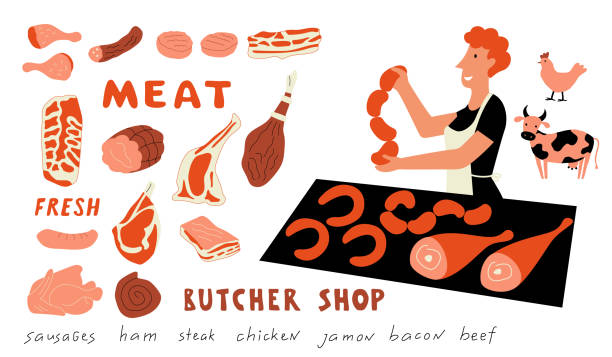For culinary enthusiasts and mindful consumers alike, the quality of meat is a non-negotiable aspect of their dietary intake. Butchery, an ancient trade, remains as relevant today as ever, cultivating relationships between the consumer, their food, and the local economy. Understanding the essentials of selecting the right meat shop can greatly enhance the overall culinary experience and contribute to sustainable eating practices.
The Significance of Provenance and Quality
When delving into the art of butchery, one quickly recognises the significance of provenance. Knowing where and how the animals have been raised not only informs us about the quality of meat we’re consuming but also its flavour profile and nutritional content. An ideal meat shop should be able to provide comprehensive details on the origin of their produce, offering transparency and traceability.
Evaluating Butchery Standards
The hallmark of a reputable meat purveyor is adherence to rigorous butchery standards. This includes the expertise of the butchers themselves, who should possess a deep understanding of meat cuts, maturation processes, and the nuances of various meat types. Mastery in butchery ensures that every cut delivered to the consumer maintains its integrity from the abattoir to the dinner plate.
Personal Relationships and Expertise
Fostering a personal relationship with your local meat shop can lead to a more personalised shopping experience. The butchers become familiar with individual preferences and can offer customised recommendations. Expert butchers serve not only as vendors but also as knowledgeable guides through the complexities of meat selection and meal preparation.
Assessing Product Range and Variety
A distinguished meat shop should showcase an extensive product range, catering to the varied tastes and dietary restrictions of its customers. This encompasses an array of beef cuts, poultry options, pork varieties, and even game meats. Specialty items like cured meats, house-made sausages, and organic offerings further solidify the standing of a premier meat retailer.
Commitment to Sourcing Ethically
More consumers are becoming conscious of ethical sourcing and animal welfare. An ideal meat shop aligns with these values, sourcing responsibly-raised animals, ensuring they are free from unnecessary antibiotics and hormones, and endorsing humane slaughtering practices. A responsible butcher is a steward of the environment and animal rights.
Exploring the Proximity and Convenience Factor
The location of your meat shop, while often overlooked, can play a substantial role in your shopping experience. Proximity means frequent visits for the freshest cuts, as well as supporting your local economy. Additionally, the convenience of a nearby butchery encourages a dialogue between the consumer and the butcher, facilitating a better understanding of meat selection and preparation.
Hygiene and Sanitation Practices
A clean and well-maintained establishment is a non-negotiable aspect when selecting a meat shop. This ensures that the products sold meet stringent health standards, safeguarding consumers against the risks of contaminated meat. Hygiene and sanitation practices also reflect the overall professionalism and attention to detail of a meat purveyor.
The Allure of Special Services
Some meat shops go above and beyond by offering special services such as dry aging, meat marination, or preparation of holiday-specific cuts. These value-added services distinguish an average meat retailer from an exceptional one, indicating their dedication to accommodating the specific needs and desires of their clientele.
The Pricing Paradigm
While finding an affordable meat shop is important, discerning buyers understand that exceptionally low prices can sometimes be indicative of subpar quality. Competitive pricing, coupled with high-quality meat, signifies that a retailer is committed to providing the best value to its customers without compromising on the quality of the produce.
Tasting Events and Community Engagement
Engagement with the community is an asset in any business, and butchers are no exception. Participation in local events, hosting tastings, or offering cooking classes can be a testament to a meat shop’s investment in their clientele’s culinary journey, as well as their dedication to fostering a food-centric community.
Reputation and Recommendations
Word-of-mouth endorsements and positive customer reviews are powerful indicators of the credibility of a meat shop. A sterling reputation, built on the foundations of customer satisfaction and product excellence, often precedes the best butchers in any locale.
Looking Beyond the Butchery: Additional Offerings
Some meat shops expand their repertoire by incorporating grocery items, fresh produce, or bakery goods. This additional convenience offers a holistic shopping experience and speaks volumes about the vision of the butcher to cater comprehensively to their customer’s needs.
Making the Informed Choice for a Meat Shop
Embarking on the quest to find the ideal meat shop is both a personal and informed choice. It involves weighing factors such as quality, expertise, service, and ethical sourcing. By ensuring these standards are met, consumers can wholeheartedly enjoy the fruits—or rather, the meats—of the butchery trade while supporting best practices in animal welfare and local businesses.
Conclusion
Choosing your perfect meat shop takes more than a cursory glance at the price list or a brief tour of the display case. It calls for a consideration of a multitude of factors that define the art of butchery. For the discerning carnivore, it signifies the beginning of a partnership with a retailer who respects the craft of butchery as much as the connoisseur appreciates the finished plate. While preferences may vary, the ultimate goal remains constant: to procure high-quality meat that aligns with one’s culinary standards and ethical beliefs, strengthening the timeless bond between butchers and their valued patrons.


